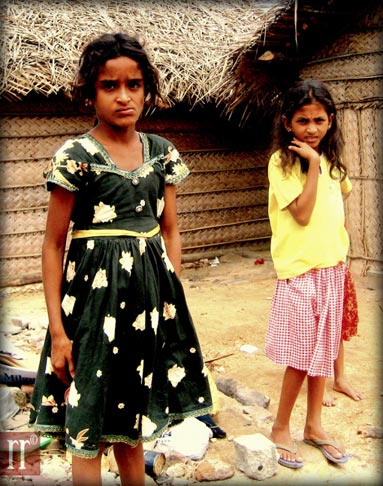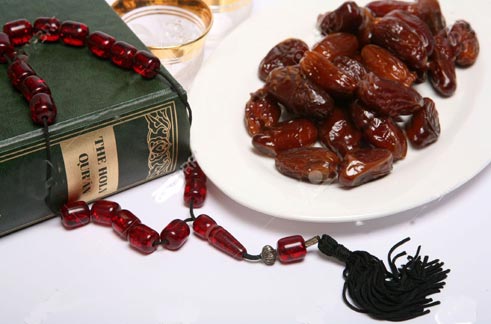Faith over fate
Ramazan for the IDPs in Puttalam:
by Dilrukshi Hadunnetti
It is the onetime in an entire year when things look different for
these people, displaced due to a long drawn out internal conflict, over
quarter century ago.
|

Muslim IDP children in puttalam
- Tableaux of Aufidius |
The IDPs in Puttalam are different, according to the displaced
themselves. They feel there is less focus on them, all because they have
failed to vociferously raise the issue of displacement and make strong
calls for restitution and resettlement as others did.
What is also different is their lack of complaints for what they do
not have, as they remain focused on their immediate needs. Even that is
less of a priority as they currently focus on something entirely
different – their spiritual journey and a greater understanding of Islam
during the holy month.
Breaking fast
It’s almost 6.00 p.m. and families in the Mujabdeen Puram IDP camp
slowly assemble out in the open. There is a small tent, under which
there is a large centrally-placed pot of ‘kanji’(porridge). A few trays
are also placed next to it, laden with sweets and dates. It is simple,
just as these people are.
As dusk falls, children are the first to rush towards the open area
where people gather, after a long day.
Soon, their parents make their way from the small one-bed roomed
homes to break the fast. During the entire day, they have been toiling
in the hot sun.
It’s Iftar time in this displaced camp in Sri Lanka’s North West,
home to Muslim IDPs evicted in the 90s by the Liberation Tigers of Tamil
Eelam(LTTE) from the North.
There is no remorse or regret as they gather to pray. For them, it is
a time of sharing in the true spirit of Islam and one that strongly
binds the community.
“It is the one time when I don’t feel hopeless about being an
internally displaced person, driven away from my home.
We are a community and we support each other. We forget our sad past
as we pray together and break the fast, together,” says Saudeena
Nuruldeen (39), a mother of two children, her children born in this camp
for the displaced and unaware of the world from which their mother come
from.
|

Ramazan essentials
-deenboutique.com |
With thousands of Muslim IDPs still living in displaced camps, with
the largest concentration still found in Puttalam, the settlement is
testimony to the island’s 27-year old war and a forgotten community
whose resettlement issues, consigned to the political backburner for all
that time.
The day’s heat is replaced by a cool breeze as they pray together, in
unison. The women mostly pray from the confines of their home but join
the ‘community’ to break the fast. Their men have just returned home
after a hard day’s work and wait patiently for the Azan to break the
fast.
“I have never known anything outside this camp. Outsiders call it
‘camp’ but for us it is home,” says Fathum Salahuddeen, a 13 year-old
girl who says: “Iftar is my happiest time because everyone gets
together.”
Fathum does not share her mother Mehurnisa’s understanding of the
need to break the fast ‘in community.’ Their little homes hardly have
the space to facilitate such an exercise. “I cook outside and would
ideally like to gather inside a living room (which does not exist) to
break the fast, with my family,” says Mehurnisa. They have long since
given up on such luxuries as they concentrate on what little is
available – and would rather not have poverty interfering with their
religious zeal. But Mehurnisa is far from unhappy.
A member of the displaced community since 1996, she recalls how other
displaced families to till a small plot to land and helped her bring up
children. “During Ramazan, this community feels closer than ever before.
With each passing year, we get closer,” she said.
Togetherness
The families receive, unlike any other time, assistance from other
Muslim families, both financially and otherwise. “During this period,
people are specially focused on a spiritual path. They share more and
look for people like us, who need support. The children are the happiest
during Ramazan. On festival day and the next day, they receive gifts and
we momentarily forget our plight as displaced persons,” says Dawood Bawa
(43), who works as a plumber. He has just returned home, with minutes to
spare, in order to break the fast with his family. For these people, the
harsh climate of Puttalam, the arid air, the lack of potential for
cultivation and the scarcity of water are temporarily cast aside during
the ‘season.’
Driven out
Out of the internally displaced persons (IDPs)
in the island, Puttalam IDPs have for long been the
politically ignored.
According to the Internal Displacement
Monitoring Center, among them, 89 per cent, or up to 65,500
IDPs, were living in host communities, the remainder in
camps and about 550 in a relocation site, as of 1 July 2015.
The overwhelming majority belong to the Tamil and Muslim
minorities. Some IDPs in Puttalam and Mannar were able to
return after the 2002 ceasefire, only to be displaced again
in 2006 (Puttalam) or 2007 (Mannar). In Kilinochchi and
Mullaitivu Districts, the whole population was displaced
during the last phase of the war (2008-2009).
IDMC counts 73,700 IDPs in the island,
based on available data.
Sri Lanka’s own truth-seeking mechanism,
the Lesson Learnt Reconciliation Commission had acknowledged
that “The issue of Muslim IDPs who were displaced from five
districts (Jaffna, Mannar, Kilinochchi, Mullaitivu and
Vavuniya) due to LTTE threats as far back as October 1990
remains one of the key post conflict challenges, which also
has a significant impact on the process of reconciliation.”
|
With innate wisdom, 61-year-old Zeenathu Lebbe says: “Allah decreed a
certain life and people are tested in different ways. Where the Prophet
lived, the conditions must have been harder. We accept this. It makes us
focus on other things such as a better tomorrow for our children and a
better income to support families.”
Over the years, they have got new housing, and many houses in the
area are now connected to the grid. But water supply is still poor and
people still have to fetch water from community taps, in most cases.
Suffering from unemployment, landlessness, poor infrastructure and harsh
climate conditions, the Puttalam Muslim IDPs are also about a
community’s resilience as well as quiet suffering.
“That comes from Islam and we derive strength from others who support
us, especially during Ramazan,” says Farook Bawa, (60), another
long-term displaced person from Mannar.
Muslims formed six per cent of the northern population, at the time
of eviction. Forced by the conflict to leave their original northern
homes, today they find themselves in displaced camps or live with host
communities.
“We are poor people. But if all the displaced get a simple livable
home by next Ramazan, which has been my wish for the past 25 years, I
think God had heard my prayers,” says Farook Bawa, with hope in his
eyes. And for all that they lack in terms of material wealth, this
displaced community perhaps reflects what their religious taught them –
to say true to their fate despite multiple challenges.
“When we break the fast, we do it together, for solidarity and
brotherhood. That’s what has helped us survive all these years the
tragedy of displacement, poverty and these harsh conditions of living,”
says Mainathul Habeeba (54).
Adds Dawood Bawa: “We focus on our faith, not fate.” |

